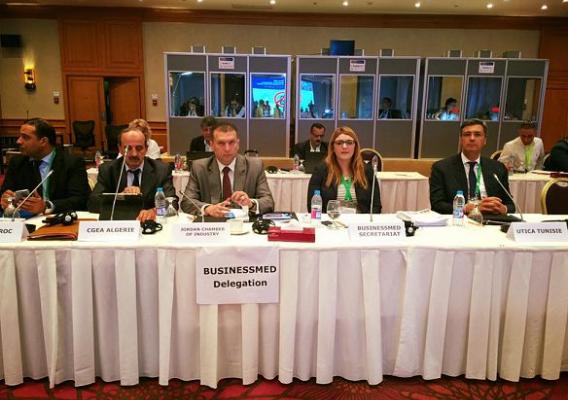BUSINESSMED at the Third Union for Mediterranean Employment and Labour Ministerial Conference
BUSINESSMED at the Third Union for Mediterranean Employment and Labour Ministerial Conference
The Union of Mediterranean Confederations of Enterprises (BUSINESSMED) represented by its Secretary General, Mrs. Jihen BOUTIBA MRAD, has attended the Third Union for the Mediterranean Employment and Labour Ministerial Meetingwhich took place in Jordan, September 26th 2016.
The opening session was held with the presence of BUSINESSMED’s partners, notably BUSINESSEUROPE, the European Trade Union Confederation (ETUC), the Arab Trade Union Confederation (ATUC), the International Organization of Employers (IOE), the European Centre of Employers and Enterprises providing Public Services (CEEP), the International Labour Organization (ILO), the European Association of Craft, Small and Medium-sized Enterprises (UEAPME).
BUSINESSMED’s delegation was composed by several members namely the Tunisian Union of Industry, Trade and Handicrafts (UTICA Tunisia) represented by Mr. Khalil Ghariani, Head of the Delegation, the General Confederation of Algerian Enterprises (CGEA), represented by Mr. Mahfoudh Megateli, the General Confederation of Moroccan Enterprises (CGEM), represented by Mr. Hichem Zouanat, and the Jordan Chamber of Industry (JCI), represented by Dr. Maher Mahrouq.
Among the institutional guests several key leaders such as European Commissioner Marianne Thyssen, Commissioner for employment, social affairs, skills and labour mobility and H.E. Ali AL-Ghezawi Jordan’s Minister of Labour.
Remembering that the Ministerial Conference follows-up on the decisions made by Ministers during the 2008 and 2010 conferences, in Marrakesh and Brussels respectively, and the ongoing work carried out by the High Level Working Group on Employment and Labour. Finally, new measures and tools would be agreed by the Ministers at the conference to improve youth employment, vocational education and training, promote employment services for young people, and support the good functioning of social dialogue in the region.
In this regards, after 1 year and half of meetings between all parties (Social Partners and representatives of the Euro-Mediterranean Region), a Tripartite Ministerial Declaration was settled.
This is the first time that Euro-Mediterranean trade unions and employers have agreed a joint declaration on social dialogue and its importance in addressing employment and labour market challenges in the Euro-Mediterranean region.
Stressing the important economic potential of the Mediterranean region while continuing to be deeply concerned by the difficult socio-economic situation and challenges that are currently facing the South Mediterranean Countries, this Ministerial Conference and especially the document that has emerged, aims at giving a fundamental role to social dialogue as a tool that should tip the scale toward a balanced policy making and social policy, promoting social development, by making labor markets and social protection systems more efficient and adapted to new changing economic and social realities.
As mentioned in the ministerial declaration on social dialogue, essential prerequisites to allow a fruitful and effective social dialogue are:
- An appropriate legal framework that will comply with the international law and the respect of freedom of association and independence between social partners;
- The setting up of an enabling and democratic institutional and legal framework at national, regional and local level;
- The promotion of social dialogue’s culture accordingly to realistic expectations, in order to create stability and social peace through the prevention of collective social conflicts.
In her intervention, BUSINESSMED’s Secretary General, Mrs. Jihen BOUTIBA MRAD, has emphasized that “All parties involved (Trade Union, Employers and Governments) should explore the potential and the added value of the social dialogue in the region with a view of promoting social peace, stability and competitiveness”.
For their part, the Social Partners have highlighted four areas of added value cooperation such as Informal work which should be integrated to formal economy and support jobs and businesses in the formal sector; youth employment and consequently the challenge for governments and social partners to tackle the lack of job opportunities in the Region; skills development which could ensure a better match between the content of education and training curricula; the regulation of the migration influx allowing a better management of the south-south and south-north influx.
The Conference was an import occasion to recognize the value and importance of social dialogue as milestones on the path towards wider regional integration and cooperation as well as an opportunity to set out a comprehensive economic agreement capable of strengthening the already existing strong partnerships on social dialogue issues in the Southern Mediterranean Neighborhood.
The Euro-Mediterranean Social Partners Declaration on Social Dialogue









